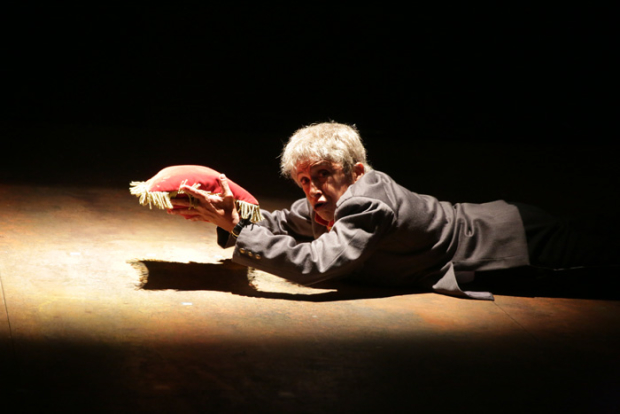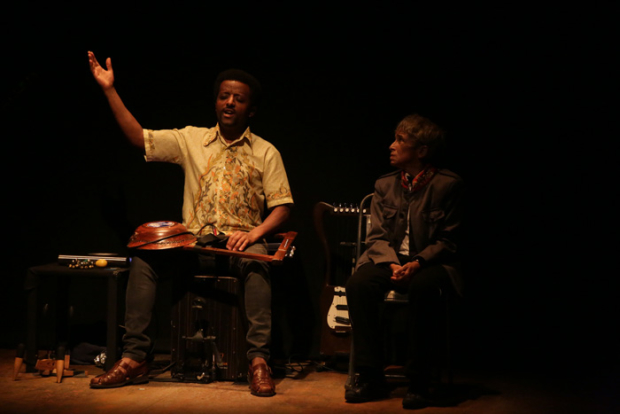The Emperor Delivers Truth in the Blurred Line Between Story and History

(© Gerry Goodstein)
The layered legacy of Ryszard Kapuściński's journalism-adjacent novel The Emperor imposes a complex set of expectations on its latest stage adaptation, a two-person play written by Colin Teevan and making its New York premiere at Theatre for a New Audience's Polonsky Shakespeare Center (a coproduction with the Young Vic in London, where it made its world premiere in 2016).
In 1974, Kapuściński set off to Ethiopia to interview remaining members of emperor Haile Selassie's royal court to document — through both facts and dramatized fiction — the downfall of Selassie's 44-year regime. The book, however, is as well known for its allegorical criticism of Kapuściński's Polish government (led by communist politician Edward Gierek) as for its insights into the corrupt machinations of the dethroned Ethiopian ruler.
Judging by the splash it made in Poland when it was published in 1978, the appeal of The Emperor is not in its historical detailing but in its emotional familiarity. Teevan and director Walter Meierjohann are certainly not at a loss for modern leaders to silently impugn with their theatrical retelling, but as they open up the piece to a less particular audience than the disillusioned socialists Kapuściński was writing for, it loses some of the power that comes from a focused punch.
All of the punch it does have is channeled through the chiseled performance of Kathryn Hunter, whose shape-shifting and occasionally acrobatic portrayals of Kapuściński's interviewees — 11 in total — are so deeply ingrained in her body, it's difficult to imagine what The Emperor could be without her (set and costume designer Ti Green gives her a nearly bare set, a single military uniform, and a handful of props with which to set her imagination loose). She rattles off one character after another — from the emperor's doting pillow bearer to his chauffeur to the official wiper of his dog's pee — all of whom share meandering memories of their beloved leader. It doesn't add up to anything for quite some time, but Hunter has a death grip on your attention with every change of posture until, finally, the pieces start to paint an edifying picture of how a dictator's delusions can become his reality and how his abused servants can remain devoted in love beyond all reason.
Teevan and Meierjohann are counting on that image to ring a few bells — as it dutifully does in an unimposing way. And yet, something keeps the audience's heart from getting involved while their heads are percolating input. The greatest amount of emotional tension comes through musician Temesgen Zeleke, who joins Hunter onstage with his Ethiopian krar lyre. Initially lending atmospheric music (composed by Dave Price), he gradually emerges from the shadows (crafted delicately by lighting designer Mike Gunning) as various iterations of Selassie's political adversaries, usually young students building their opposition power. As usual, it takes the booming sound of a long-silenced voice filling a room in protest to break through to the heart of the matter.

(© Gerry Goodstein)










